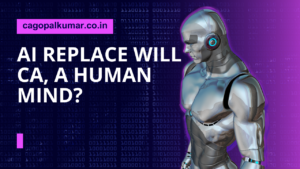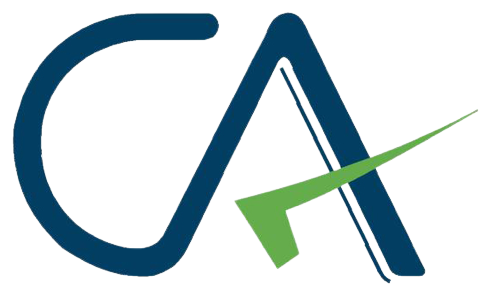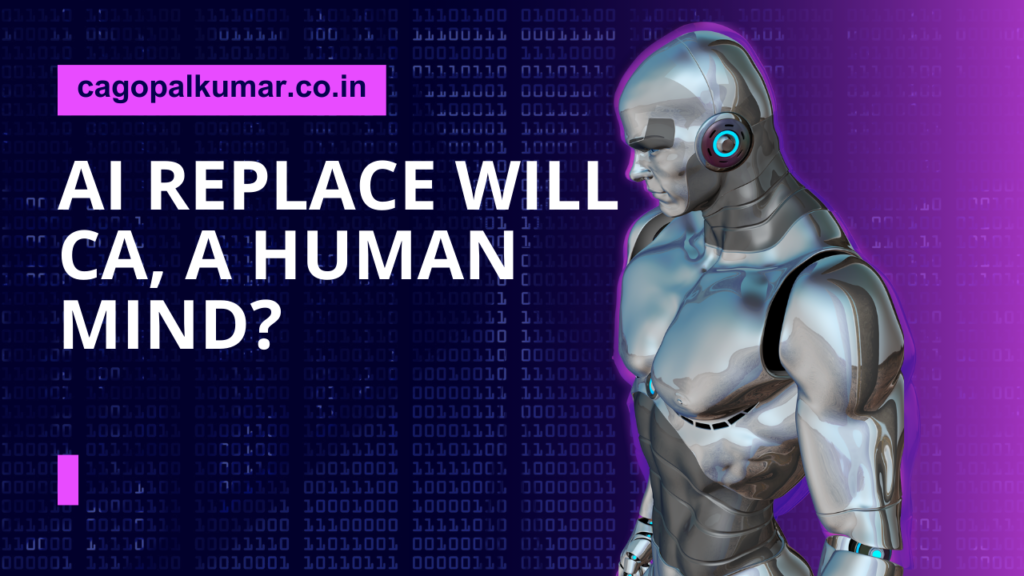AI will replace CA? AI Replace Human Mind?
Artificial Intelligence (AI)- involves using computers to do things that traditionally require human intelligence.
AI can process large amounts of data in ways that humans cannot. The goal for AI is to be able to do things like recognize patterns, make decisions, and judge like humans. To do this, we need lots of data input into them.
Artificial intelligence leverages computers and machines to mimic the problem-solving and decision-making capabilities of the human mind.

Role of Chartered Accountant (CA)
A Chartered Accountant (CA) is a highly qualified and skilled financial professional who is trained to handle various financial and accounting tasks for individuals, businesses, and organizations.
The role of a CA can encompass a wide range of responsibilities, including:
Financial Reporting and Analysis: CAs are responsible for preparing and analyzing financial statements, which include the balance sheet, income statement, and cash flow statement. They help businesses and individuals understand their financial performance and make informed decisions.
Auditing: CAs often perform audits of financial statements to ensure accuracy and compliance with relevant accounting standards and regulations. They provide an independent assessment of an organization’s financial information.
Tax Planning and Compliance: CAs help clients navigate complex tax regulations and optimize their tax liabilities. They provide advice on tax planning, prepare tax returns, and ensure compliance with tax laws.
Management Accounting: CAs assist in cost analysis, budgeting, and forecasting. They provide valuable insights into management for making strategic decisions.
Financial Management: CAs may be involved in managing investments, assessing financial risks, and providing guidance on capital budgeting and financing decisions.
Consulting and Advisory Services: CAs offer expert advice on various financial matters, including mergers and acquisitions, business valuation, financial restructuring, and risk management.
Artificial Intelligence (AI) effects Chartered Accountant (CA)?
Yes, AI (Artificial Intelligence) can aid in various aspects of Chartered Accountancy (CA) and the field of accounting in general. Here is some ways
AI can assist CAs:
Data Entry and Automation: AI can automate mundane and repetitive tasks like data entry, allowing CAs to focus on more complex and value-added activities.
Data Analysis and Insights: AI can analyze large volumes of financial data quickly, identifying patterns, anomalies, and trends that may not be apparent through manual analysis. This can help CAs make more informed decisions and provide valuable insights to clients.
Risk Assessment and Fraud Detection: AI algorithms can be used to detect potential instances of fraud or financial irregularities by analyzing transaction data for unusual patterns.
Audit Support: AI-powered tools can assist in conducting audits by systematically reviewing financial records, comparing data, and identifying discrepancies.
Predictive Analysis: AI can help predict future financial scenarios based on historical data, assisting CAs in making accurate forecasts and advising clients accordingly.
Tax Planning: AI algorithms can assist in analyzing tax codes, regulations, and financial data to optimize tax planning strategies for individuals and businesses.
Client Interaction and Communication: AI-powered chatbots and virtual assistants can handle routine client inquiries, appointment scheduling, and information dissemination, freeing up CAs’ time for more complex tasks.
Learning and Training: AI can be used to develop personalized training programs for aspiring CAs, adapting to their learning pace and style.
Document Management: AI can assist in organizing and managing financial documents, making it easier to access and retrieve necessary information.
Continuous Learning and Research: AI can help CAs stay updated with the latest industry trends, regulations, and best practices by aggregating and summarizing relevant information from a wide range of sources.
Artificial Intelligence (AI) threat for Chartered Accountant (CA)?
AI will replace CA? AI Replace Human Mind? Artificial intelligence (AI) has the potential to change many industries, including the accounting and auditing field in India. However, it’s important to note that AI is not a replacement for human workers, but rather a tool that can assist them in completing tasks more efficiently and accurately.
In the field of accounting and auditing, AI can help with tasks such as data entry, financial analysis, and identifying patterns and anomalies in financial data. This can lead to more accurate and timelier financial reports and can also reduce the risk of human error. However, it’s important to note that AI is not capable of replacing the critical thinking and decision-making skills of human workers. It is also important to consider the ethical implications of using AI in accounting and auditing.
It is also important to note that in India, the Institute of Chartered Accountants of India (ICAI) has recognized the importance of technology in the accounting and auditing field and has been working to integrate technology into its curriculum and professional development programs. In conclusion, while AI has the potential to change the accounting and auditing field in India, it is not likely to replace human workers entirely.
Rather, it will likely be used as a tool to assist them in completing tasks more efficiently and accurately.
Future of Artificial Intelligence (AI) with Chartered Accountant (CA)
The future of AI in the field of chartered accountancy is expected to be transformative, offering a wide range of opportunities and challenges. Here is some potential ways AI could impact chartered accountants:
Automation of Routine Tasks: AI can automate repetitive and time-consuming tasks such as data entry, invoice processing, and transaction categorization. This can free up chartered accountants to focus on more strategic and value-added activities.
Data Analysis and Insights: AI-powered tools can analyze large volumes of financial data quickly and accurately, enabling chartered accountants to gain deeper insights into financial performance, identify trends, and make informed decisions.
Risk Assessment and Fraud Detection: AI can help in identifying unusual patterns or anomalies in financial data, which can aid in detecting potential fraud and assessing financial risks.
Forecasting and Predictive Analytics: AI algorithms can be used to predict future financial trends and outcomes, helping chartered accountants provide more accurate financial forecasts and strategic planning advice to clients or organizations.
Client Interaction and Communication: AI-powered chatbots and virtual assistants can enhance client interaction by providing instant responses to common queries and providing basic financial advice.
Regulatory Compliance: AI can assist in tracking changes in tax laws and regulations, ensuring that financial statements and reports remain compliant.
Professional Development: AI could be used in personalized training and development programs for chartered accountants, helping them stay updated with the latest industry trends and regulations.
Audit Process Enhancement: AI can streamline the audit process by analyzing large datasets and flagging potential discrepancies, reducing the time and effort required for audits.
Business Process Optimization: AI can help optimize internal processes within accounting firms, leading to increased efficiency and productivity.
Ethical Considerations: The increased use of AI in the profession could raise ethical questions, such as responsibility for AI-driven errors, data privacy concerns, and the potential impact on job roles.
It’s important to note that while AI offers significant potential benefits, it is not without its challenges.
The Institute of Chartered Accountants of India (ICAI) has recognized the importance of technology in the accounting and auditing field and has been working to integrate technology into its curriculum and professional development programs.


